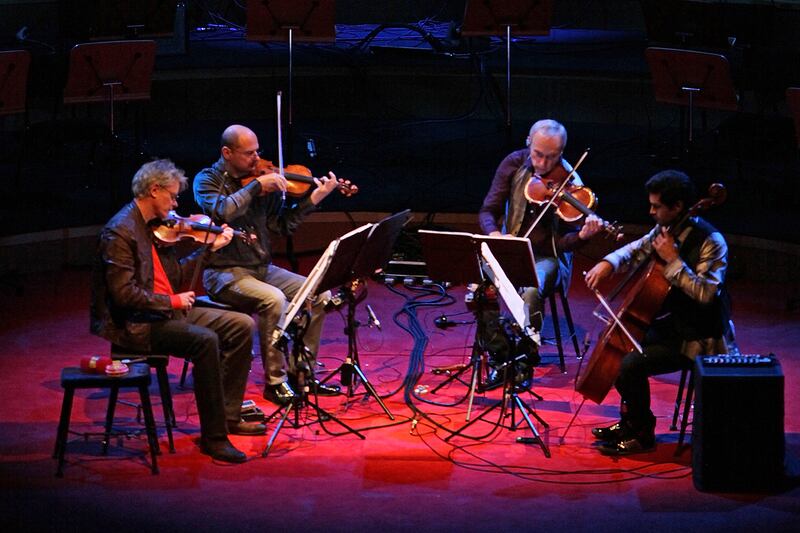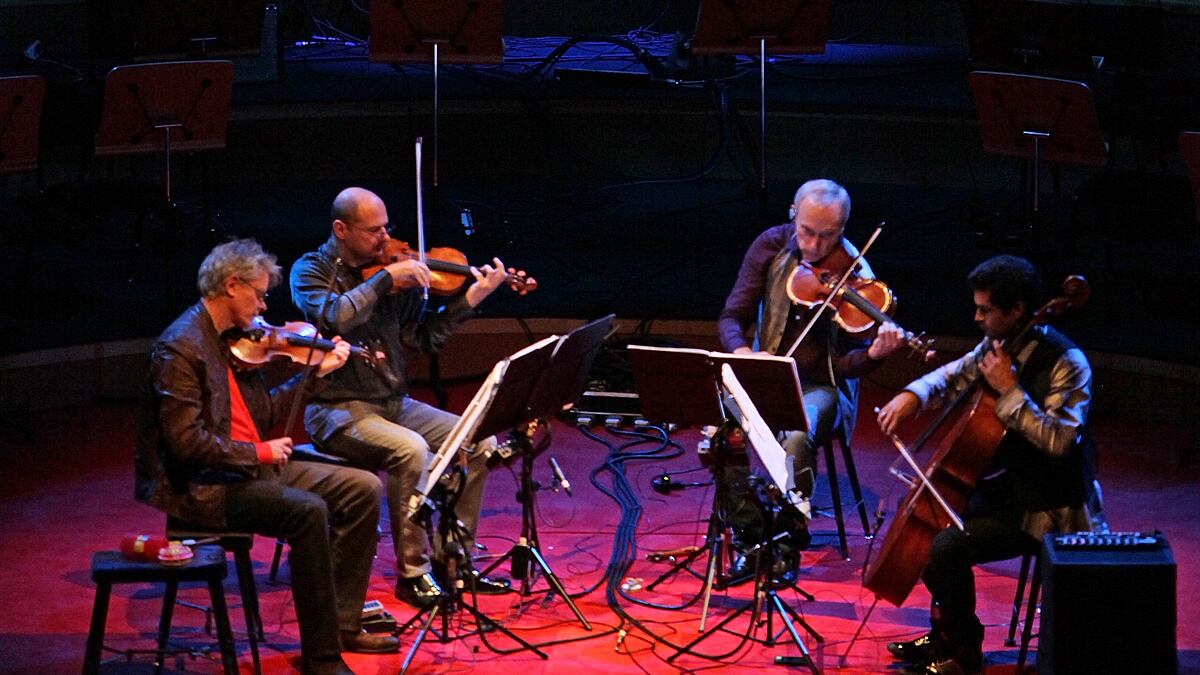In the 19th century, Franz Liszt set about translating some of the greatest works of literature into symphonic tone poems. His compositions adapted Goethe, Dante, Hugo, and Byron, as well as the myth of Prometheus, into lush, sweepingly romantic extravaganzas that, with their loyalties in another medium, allowed Liszt to explode conventional musical forms. They received a fair amount of vitriol at the time; critics thought they were pretentious and overblown. Yet the idea that non-operatic, non-incidental music could recreate and amplify a literary text was novel, and Liszt’s experiments would influence musicians from Richard Strauss, whose Don Quixote has become a classic) to Nirvana frontman Kurt Cobain, who collaborated with Beat writer William S. Burroughs on the EP The “Priest” They Called Him.
Add Kronos Quartet to the list. “People who regularly go to concerts have somehow convinced themselves that music is a refuge, that it’s a place to hide from the world of thoughts and ideas and action,” says David Harrington, the founder and violinist of the 40-year-old ensemble. “I’m intending to spend the rest of my life attempting to change that perception,” he says. The group has played compositions that sampled the journalism of I.F. Stone, accompanied Allen Ginsberg’s “Howl,” and performed with Howard Zinn and Noam Chomsky. Harrington, who cites Kafka and Rilke as major influences, sees these collaborations as part of Kronos’ wider mission: to bring the entire world, with all its messiness, violence, beauty, and humanity, into the all-too protected, bubblelike classical-music venue. Liszt, in comparison, sounds like a slacker.
It is in the spirit of recreating, on stage, the world’s diversity, that Kronos is opening the 2012 PEN World Voices Festival of International Literature Wednesday night. For a concert at the Metropolitan Museum of Art, the quartet will perform alongside gay Jewish American playwright Tony Kushner (Angels in America), Iranian-born French graphic novelist Marjane Satrapi (Persepolis) and Italian-Palestinian journalist and writer Rula Jebreal (Miral). “We’ve never done a concert like this before,” says Harrington. “But I think it’s pointing at directions for a lot of our future.”
After PEN Festival organizer Laszlo Jakab Orsos approached Kronos about participating in the event, Harrington began going through a list of authors and potential collaborators. “The first thing that I look for when I’m thinking about bringing a speaker into our work is the quality of their voice,” he says. When Kronos commissioned Scott Johnson’s 1991 piece How It Happens, which uses extensive clips from I.F. Stone’s lectures, the quartet was not only drawn to the lefty journalist’s stark exposé of the FBI’s chilly Cold War dealings, but also to the sound of his voice. “It’s so amazingly beautiful and interesting,” says Harrington. “He can say some of the most challenging and incisive things with this kind of a sunlight in his voice.” Stone’s cheery staccato greatly influenced the music Johnson composed: jagged, pizzicato bursts and syncopated rhythms played with a bright timbre. But the dark view of America that his words portray is present, too, lurking underneath the surface, like in a discordant hoedown, a sly subversion of a classic American folk trope.

Once the group finds a collaborator with a beautiful voice and interesting thoughts, it moves on to the music. Sometimes the quartet will commission a composition, as with How It Happens and Howl USA, which accompanies a reading of the famous poem by Ginsberg, who made a new recording especially for Kronos. Other times, it will pick various selections from its enormous repertoire to play. For example, when the group performed with Zinn in 2006, it opened with “O Mother the Handsome Man Tortures Me,” a song from Iraq. “So the whole question of the American invasion of Iraq became part of this show,” says Harrington. “And there were various other pieces that we had pre-chosen, so Howard kind of riffed off of the music we played … There were a lot of different kinds of music, and he could go in any direction he wanted.”
Kronos has increasingly been experimenting with loose, improvisational, jazz-like performances, which is the kind of program it’s planning for the PEN event. (Harrington had not finalized the music for the program when I spoke to him on Friday, and said that they were most likely going to completely improvise the Satrapi portion.) Each of the writers will get a chance to read, rhyme, scat, and do whatever they want, with Kronos playing behind them. The quartet will also perform a Swedish song and a movement from How It Happens, over some visuals, in hopes of triggering a freewheeling conversation among the three writers and the musicians. “The way music expands words and expands thoughts, and the way thoughts and words expand music, is really incredible,” says Harrington.
“Every rehearsal that Kronos has ever had, we use words, and we use images—to create sounds and to create variety in sounds,” he adds. “When we’re working with composers, we’re hearing their life’s story, or we’re hearing poetic images, or we’re hearing about ideas of tone color that somehow give us a little more information regarding how to interpret their work. Things are much more related than we think.”




